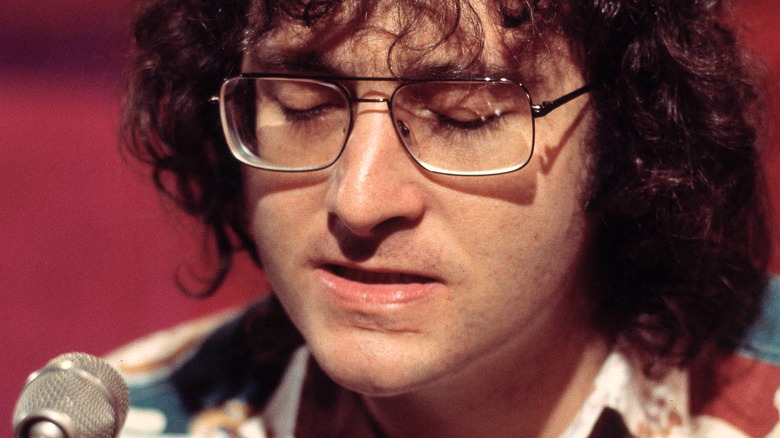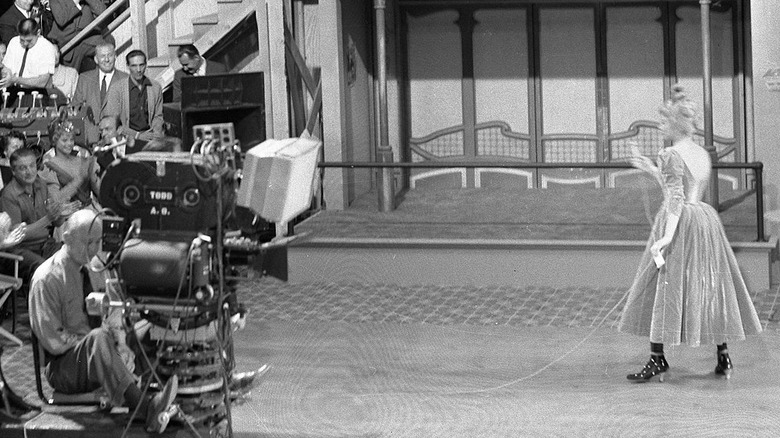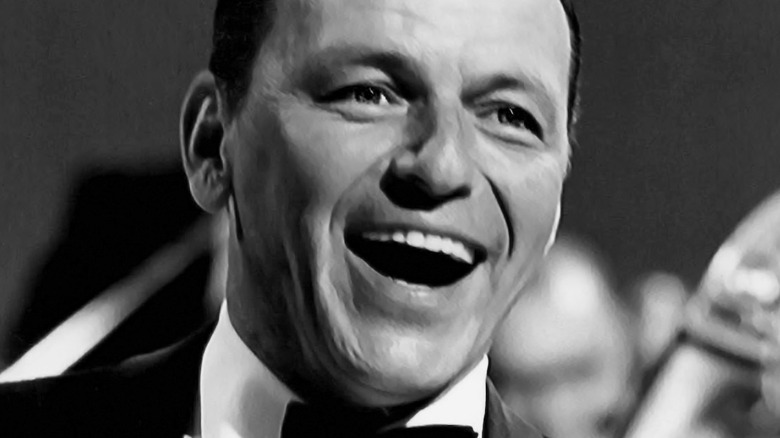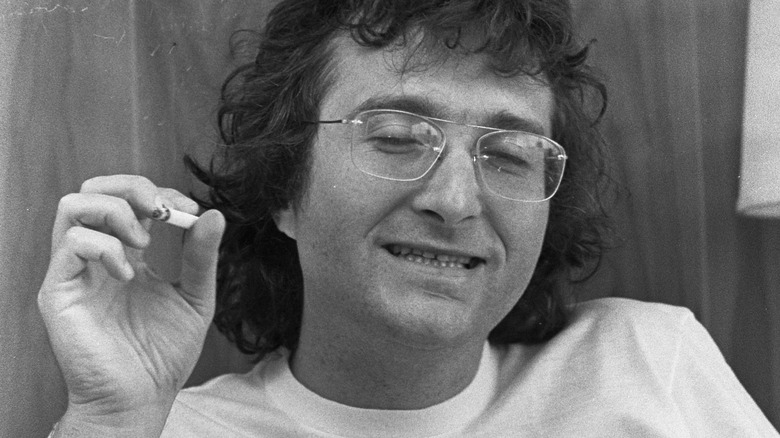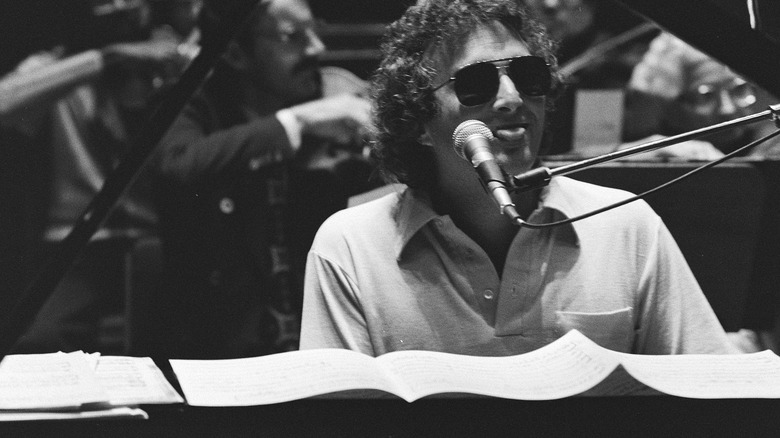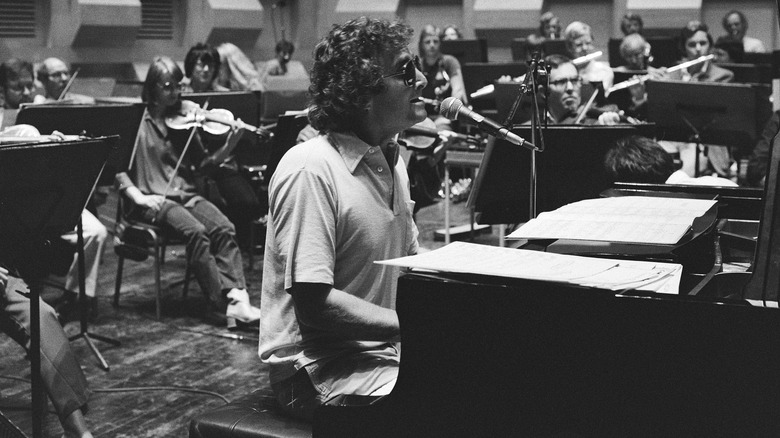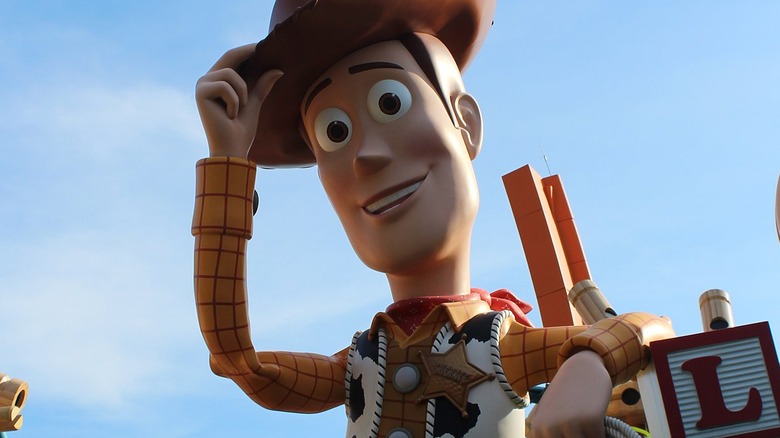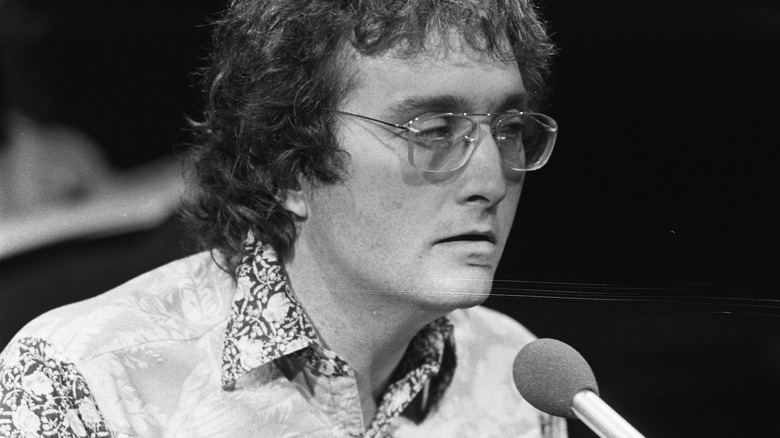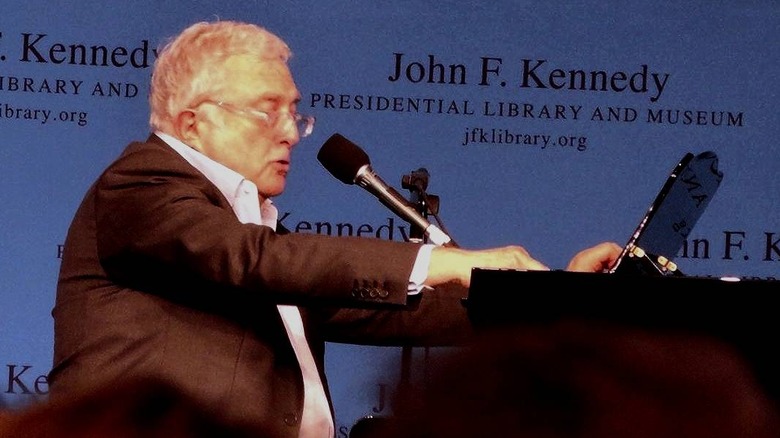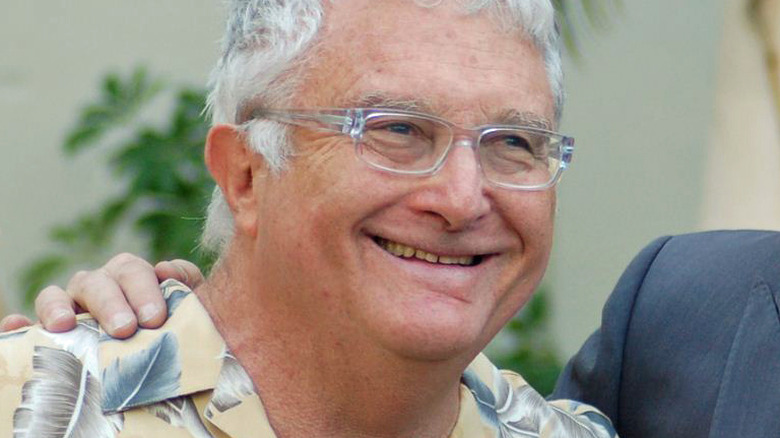The Untold Truth Of Randy Newman
Randy Newman is a man of many talents and, frankly, there aren't too many musicians to which one can compare him. As The Atlantic points out, many simply know him as the "Toy Story" guy, but over his five decades in music, his accomplishments are widespread and astonishing. While his movie music may be what most are familiar with, it's his ability to write and perform songs unlike any other musician that has made him so well-respected and iconic (as well as landed his 1974 album "Good Old Boys" on Rolling Stone's list of the 500 greatest albums of all-time).
Perhaps most of all though, Newman has simply worked hard at making music. In 1979, his brother stated that Randy was just a lonely guy who worked hard on his songs but never seemed satisfied with himself (per The Ringer). Despite this, he's always at least liked his own voice, according to Mastertapes, which is as distinct as the music he makes. He told the podcast, "I'm very hard on myself, writing and dancing, whatever I do. But I always liked my voice. I always felt fairly comfortable with it."
In 2000, The Jewish Journal called Newman a "misunderstood genius." Now approaching 80 years old, Randy Newman is still making music, clearly still working hard, and still winning awards.
He spent his childhood in Los Angeles and New Orleans
Randall "Randy" Stuart Newman was born on November 28, 1943, in Los Angeles, California, into a large Jewish Ukrainian family. His father, Dr. Irving George Newman, had been one of t10 siblings and when he was young, according to Billboard, his Ukrainian immigrant parents divorced and his mother moved the children from Connecticut to California.
There, Irving Newman married Randy's mother, Adele Fox, and was a captain in the U.S. Army serving in Italy when Randy was an infant. As described in "Randy Newman's American Dreams" by Kevin Courrier, young Randy spent much of his early years traveling with his mother (who herself was one of seven children) through the South, and, eventually, they settled down in New Orleans, Louisiana — which to Randy felt like being on another planet. According to Newman's recollections, his parents could not have been more different: His mother was gentle and kind, whereas his father, while handsome and intelligent, was famously very short-tempered, reports Vanity Fair.
While Newman would eventually move back to Los Angeles permanently when he was 11 years old, his time in New Orleans had a significant impact on him. For one, he noticed the racism and the way the city was segregated, something that would inspire the stories of many later songs (per "Randy Newman's American Dreams"). As described by Rolling Stone, the time Newman spent in The Big Easy would also influence his musical style.
He started playing music at a young age
Randy Newman was surrounded by music from a young age, and by 7 years old he was already learning to play the piano (per TV Guide). As described in "Randy Newman's American Dreams," it was his father Irving — who had himself abandoned the pursuit of a career in music — who had encouraged Randy to play. In fact, Irving had felt he had disappointed his family by going into medicine instead of music, according to Vanity Fair.
As Randy grew older, his musical skills improved, but the young Newman also suffered from extremely low self-esteem — in part due to being cross-eyed, which he underwent many operations to try and correct — as well as shyness. He worked to overcome this by developing a persona as a class clown who would crack jokes, skip class, and drink with his friends, while also rejecting religion and embracing atheism (per "Randy Newman's American Dreams"). He also received good grades with minimal effort, as told by Allen Adashek, a childhood friend who spoke to People.
By this time as a teenager, music became Newman's solace. He wasn't a natural and had to work hard at it, and soon, he began writing and playing his own songs. In 1962, he released his first single for Dot Records titled "Golden Gridiron Boy," a song from the perspective of a kid losing his girlfriend to the high school football star — although according to TV Guide, it did not sell many records. Still, Newman received his first ever mention in Billboard, the popular music magazine, while still just a teenager.
His musical family influenced him greatly
While Randy Newman's father may have abandoned a career in music, much of the musically inclined Newman family hadn't. Three of Newman's uncles — Alfred, Lione, and Emil — all were composing music in Hollywood for the film industry. In fact, Alfred had been a child prodigy, according to Billboard, and the entire reason the Newman clan all moved back to Los Angeles permanently was because Alfred had been offered a job on a United Artists movie.
Alfred would go on to score music for over 200 films and win nine Oscars out of 45 total Academy Award nominations (per the Hollywood Walk of Fame). In "Randy Newman's American Dreams," the author explains how Newman was deeply influenced by these family members and would study his Uncle Alfred's film scores, and as a teenager he would sneak onto the 20th Century Fox lot where his uncle then worked as the musical director.
Vanity Fair describes how the Newman family shaped generations of music in the film industry and how those formative years watching his uncle made it so that large arrangements of music came naturally to Randy. As a teenager, he actually was able to physically be on his uncle's soundstages and watch the music being composed live, memories that continue to stick with him to this day.
He wrote music for others until releasing his first album in 1968
While "Golden Gridiron Boy" failed to capture the audience he may have hoped for, Randy Newman would go on to study musical composition at the University of California at Los Angeles (although he didn't graduate) and secure a gig writing songs primarily for other people over the next few years after (per Britannica).
Rolling Stone describes Newman as having taken "the long road" to success, first writing hits for others, such as Three Dog Night ("Mama Told Me (Not to Come)") and Dusty Springfield ("I Don't Want to Hear It Anymore"). He even wrote a song for Frank Sinatra, titled "Lonely at the Top," per "Randy Newman's American Dreams." The song lyrics were, in many ways, the antithesis of a typical Sinatra song, even subtly poking fun at the star's lifestyle and fame. At the meeting where Newman performed the song for Sinatra, Sinatra left it befuddled and without saying a single word. According to Newman, later in life, Barbara Streisand and Michael Jackson also rejected songs from him (per The A.V. Club).
Then in 1968, Newman released his first full-length self-titled album. It wasn't a huge hit, but it did bring him recognition (with more established and well-known artists continuing to cover his songs). Billboard at the time called Newman "a bright new writing talent" with "topnotch original material." It was the start of a long, long recording career for Randy Newman.
His music has been misunderstood over the decades
There's no way around it: People either seem to get Randy Newman or they don't. And, simply put, over the years, a lot of people (not just Frank Sinatra) have misunderstood his music since he emerged onto the scene. In fact, Eagles drummer and founding member Don Henley has called Newman the "most misunderstood and underappreciated recording artist alive" (per the Los Angeles Times).
First and foremost, unlike most well-known songwriters, Newman's music is not autobiographical. He writes songs from the perspectives of characters that he creates. The lyrics often lean heavily into satire and irony. "It doesn't have much to do with how I'm feeling, what I write," he told NPR in 2008, and often his songs are from the perspectives of people he disagrees with completely.
According to The Guardian, some of his songs, such as "Short People," which mocks those with the prejudiced beliefs portrayed in the song, have been so misunderstood, he's received death threats. In his 1974 song "Rednecks," he sings from the point of view of an extremely racist white Southern man (per The Ringer).
Even his hit song "I Love L.A." which has become an anthem of sorts for the city is satirical (via the Los Angeles Times). As described by Newman himself, irony just wasn't something a lot of Americans understood early on in his career. What does he credit for that shift in understanding irony? "The Simpsons." "Now people sort of get what I'm doing," he told LAist in 2018.
His songs are intended to be funny
As his songs are satirical and ironic in nature, a listener is supposed to find Randy Newman's songs funny. Rolling Stone has even called Newman a "comic genius." According to Newman himself in an interview with The A.V. Club, that is precisely the goal of his music: to make people laugh, and he compares what he does to Weird Al Yankovic.
Perhaps unsurprisingly, Weird Al has also cited Newman as an influence of his, per The Washington Post. Discussing "Sail Away," for instance, Newman explained to Rolling Stone that he concocted a song in his imagination that was a sea shanty for a slave ship. It's shocking when you realize this (especially considering how catchy his tunes can be), certainly, but he also says that making a song simply state that slavery is bad wouldn't be as effective.
In 1992, The Baltimore Sun described Newman's songs as "darkly funny," "downright disturbing," and "brilliantly sarcastic," adding that all of this seemed to hurt his commercial appeal, which did not seem to concern Newman in any way. In 2021, Far Out Magazine described "Short People" as "vicious" but noted that its "jolly bouncing melody" is what made listeners seem to misunderstand that it's a song about an absolute maniac. "Because it was a hit," Newman told Rolling Stone, "the song reached people who aren't looking for irony."
He is a successful film score composer
On top of being a successful songwriter, Randy Newman also composed dozens of well-known and award-winning film scores over the decades. This part of his career was jump-started by an adaptation of the book "Ragtime" in 1981. In "Randy Newman's American Dreams," the author describes how Newman continued to surprise as a composer.
For instance, he didn't utilize ragtime as one might expect for a movie titled "Ragtime," but composed waltzes and polkas instead. More importantly, though, the biography argues, composing music for film provided Newman with the finances needed so that he could continue to write and perform music for his albums without the need of selling out his vision to make his music commercially successful.
Other well-known film scores of Newman's include "The Natural" (1984), "Parenthood" (1989), "Awakenings" (1990), "James and the Giant Peach" (1996), "Pleasantville" (1998), "Meet the Parents" (2000), "Seabiscuit" (2003), "Marriage Story" (2019), and his many collaborations with Pixar Animation Studios (via Far Out Magazine). He also co-wrote the film "Three Amigos!" with Steve Martin and Lorne Michaels as well as wrote songs for it, according to the Hollywood Walk of Fame.
He was terrified to compose music for 'Toy Story'
Of all Randy Newman's film scores, it's likely that his music from Pixar's "Toy Story" franchise is his most famous. Although he had plenty of experience composing by the 1990s, Newman was scared to make music for "Toy Story," because he had never done anything like it before. "It started a terror in my stomach," Newman told NPR in 2019. He had never composed music for either a children's film or an animated film, but Pixar really wanted him.
He agreed and had an orchestra of around 100 musicians to work with, according to The Hollywood Reporter. Clearly, it proved to be a fruitful partnership and even snagged Newman an Oscar nomination. He composed the music on the next three "Toy Story" movies as well, winning an Academy Award for "I Can't Let You Throw Yourself Away" from the fourth film, as reported by The Associated Press.
Newman told NPR that the reach of "Toy Story" is incomparable and brought his music to hundreds of millions of people who otherwise wouldn't know his work. Nowadays, Newman says he's more than happy to be known as the "Toy Story" guy over the "Short People" guy (per the Australian Financial Review). At his concerts now, he sees far more children than ever before and keeps that in the back of his mind when performing, sometimes leaving some of his dark-themed songs out of the rotation if there are too many young people in the audience (per THR).
He doesn't talk much about his personal life
While he's given plenty of interviews over the decades, one thing is apparent: Randy Newman doesn't talk much about his personal life. He's more than happy to discuss his music, the movies he's composed for, or where his dark humor comes from, but rarely does he discuss either of his two marriages or his five children. In a rare mention of his children in 1983, he joked with People magazine that they had no clue what he did for a living and that he spent a lot of time worrying about them. As adults, he has good relationships with all five of his children. His oldest son Amos is even his agent. In fact, he found out he was nominated for an Academy Award for "Marriage Story" when his son/agent sent him a text (per USA Today).
In 1990, he married his second wife Gretchen Preece, a film producer, with whom he had two children. In recent years, they've appeared publicly at award shows and events together, as well as in a few videos shared online from their home (via CBS News). As mentioned in People, he's a homebody.
Newman has an abundance of awards
When asked if he had stopped counting how many awards he's been nominated for, Randy Newman told USA Today, "No, it's special every single time." While awards are not his goal, he appreciates the recognition — which is good, because he's received a lot of it. Just two years after his first album, Newman's record label described him as "one of the world's great singer-writer-arranger-musicians" (via Billboard).
According to RandyNewman.com, since then, he has won two Oscars, seven Grammys, and three Emmys. He was inducted into the Songwriters Hall of Fame in 2002, where they described him as "one of the most musically adept and stylistically diverse singer/songwriters in the industry." He received a star on the Hollywood Walk of Fame in 2010. He was inducted into the Rock and Roll Hall of Fame in 2013, referring to him as "one of pop music's secret hidden weapons."
Even approaching his eighth decade, Newman doesn't show any sign of slowing down, so there may be more awards and recognition yet to come.
He won a Grammy for a song making fun of Vladimir Putin
Randy Newman's ancestral heritage is Ukrainian (his grandparents immigrated to the United States to avoid starvation, according to Vanity Fair), so after the crisis of 2014 in Ukraine, where Russia invaded the Crimean Peninsula under the orders of Vladimir Putin, Newman decided to write a song about him. Released as a single and titled "Putin," the song is a sarcastic takedown of the Russian leader. He performed the song on "Late Night with Stephen Colbert" with the lights low and a montage of Putin photographs behind him, including the famously mocked photo of a shirtless Putin on horseback (per Billboard).
"Putin does not have a friend in Randy Newman," The Hill wrote in a headline, referencing Newman's famous "Toy Story" song. Newman told Vulture that he thought the song wasn't even that hard on Putin even though he was a "terrible person." He joked with Rolling Stone that Putin was the most powerful man in the world, but wanted to be Tom Cruise or Brad Pitt.
The song resonated. It won Newman a Grammy award. In accepting it, Newman said that he had worked on the song and was proud of it. "I appreciate the attention. Thank you. Please give me another one next year," he quipped (per RandyNewman.com).
He wrote a quarantine anthem during the COVID lockdown
Proving he's as human as the rest of us, during the boredom of the COVID-19 lockdowns, Randy Newman wrote and performed a song about quarantine. The song, titled "Stay Away," was first recorded by his wife and uploaded to his YouTube channel; he used it to raise money for the Ellis Marsalis Center for Music, an organization that assists young musicians in New Orleans.
In the video, Neman tells his viewers before singing, to stay 6 feet away from people, to wash their hands religiously, and to not touch their face. He would go on to perform the song remotely for "The Late Show with Stephen Colbert," where he joked that people were calling it the greatest song ever written (via Pitchfork). He also performed it remotely for a segment on "CBS Sunday Morning."
The boredom also led Neman to write a song about then-President Donald Trump, although he ended up never releasing it. As it turns out, Randy Newman isn't much of a fan. "I can't stand him, and I've never written something that was impelled by hate the way this one is," he told WBUR, explaining why he probably would never release the song. "Little did I know [Donald Trump] would make [George W. Bush] look like Winston Churchill," he also told Rolling Stone.
He canceled his latest tour after realizing he broke his neck
In March of 2022, Randy Newman announced that his summer international tour was being canceled and would have to be rescheduled. The reason? He found out that he had broken his neck, which required surgery. In his initial announcement, according to Variety, Neman didn't mention the broken neck, only stating that he desperately missed touring after two years of COVID-19 restrictions, but his doctor said he wasn't able to yet.
Later, as reported by Billboard, Newman clarified that his doctors had noticed he was shorter and they recognized that something was wrong with his neck. Newman confirmed to them that it had been hurting and that's when they figured out it was broken. As a result, Newman had to have an operation, which was fortunately successful.
According to RandyNewman.com, the tour was officially rescheduled for 2023. "Could this be payback for having written Short People?" he joked (per Deadline).
